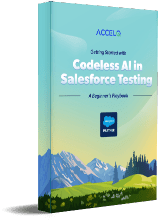How Salesforce QA Testing is Revolutionizing in 2023?

In the fast-paced business world, embracing a customer-centric mindset has become essential for success.
Salesforce CRM has emerged as a pivotal component for organizations to establish and nurture customer relationships effectively.
However, integrating multiple systems with Salesforce CRM brings the need for a scalable and maintainable Salesforce QA testing process.
In this article, we will explore the evolving landscape of Salesforce QA testing and provide valuable tips and best practices for successful QA testing in 2023.
What is Salesforce QA Testing?
Salesforce QA Testing, also known as SFDC testing, plays a crucial role in ensuring the smooth functioning of business-critical processes that rely on Salesforce CRM. Salesforce is a widely used CRM system that empowers organizations to comprehend customer needs and engage with them in fruitful ways. It offers tailored products and services that align perfectly with their requirements.
Given that Salesforce enables different teams to connect with their customer base and gather vital information, it acts as a foundation for carrying out essential business tasks. Any flaws in this core system can have a severe impact on sales and customer service operations, potentially leading to high customer churn and endangering the business.
To ensure that the Salesforce CRM runs seamlessly and without disruption, organizations must prioritize Salesforce QA testing.
This is particularly crucial in an era where businesses must facilitate personalized and adaptable interactions. Salesforce QA testing enables organizations to keep their Salesforce CRM up-to-date, aligned with business requirements, and responsive to customer demands. Over the past two years, customer interactions with businesses have been significantly influenced, and SFDC testing aids in addressing this pace of change. Moreover, it empowers organizations to work against the clock and deliver unparalleled customer experiences, regardless of the device, channel, or touchpoint.
SUGGESTED READ - A Beginner’s Guide To Salesforce Testing
How is Salesforce QA Testing Evolving?
Since the inception of Salesforce QA testing, testing teams have been responsible for repeatedly testing and verifying features and functions. This approach sufficed when Salesforce instances were simple and uncomplicated.
However, as the enterprise system gained popularity and complexity, manual testing activities became impractical and inefficient. Here are the notable changes in SFDC testing over the years:
- Increasing Complexity: With the intricate customizations and personalization that Salesforce systems now undergo, the Salesforce QA testing process has become significantly more complex. This has led to a surge in the number, frequency, and complexity of test cases.
- Shift Towards Automation: The abundance of test cases has compelled organizations to move away from manual approaches and adopt automated testing. However, frequent system updates, Salesforce’s shadow DOMs, and the complex DOM structure pose challenges for Salesforce QA automation testing.
- Balancing Manual and Automated Testing: Striking a balance between manual and automated Salesforce QA testing is challenging. Testers have had to adopt a risk-based approach, focusing on critical features and often disregarding the rest.
- Addressing Test Coverage Gaps: The fragmented and manual approach to testing leaves significant gaps in test coverage and quality, undermining the objective of continuous, round-the-clock testing. Consequently, organizations are now seeking modern testing approaches that can align with platform technicalities and enable effective test automation.
- Embracing Automation Tools: Recognizing the numerous benefits of automation, organizations are embracing SaaS-based, codeless QA testing tools that are user-friendly and require minimal or no professional coding skills.
Salesforce Test Automation in Shifting Landscape
A Beginners’ Guide
Challenges of Salesforce QA Testing:
Effective Salesforce QA testing comes with its own set of challenges that can impact the quality and relevancy of test data. Some notable challenges include:
- Expensive Maintenance of Multiple Salesforce Sandboxes: Maintaining multiple sandboxes can significantly add to the cost of production, making it a costly endeavor for organizations.
- Irrelevant Data Affecting Testing: Sorting through irrelevant data to set up a Salesforce sandbox with relevant and sized-to-fit data can be time-consuming. Testing with incorrect data can lead to defects in production, despite comprehensive testing in the sandbox.
- Confidential Data Protection: Testing in Salesforce with real data poses the risk of unauthorized access to personal or confidential information. Without proper anonymization of sensitive data, it becomes vulnerable to security breaches across environments.
- Slow Development Cycles and Delayed Release Deadlines: Sandbox refreshes and manual data movement processes can result in delays in development cycles, affecting release timelines.
- Managing User Permissions Sets: Transferring metadata object permission profiles between different environments while ensuring security and compliance can be challenging.
- Regression Testing with Salesforce Seasonal Releases: Frequent platform changes in Salesforce seasonal releases require thorough testing to identify and address any issues or defects in existing tests.
6 Reasons Why You Need to Implement Salesforce QA Testing
Implementing Salesforce QA testing brings numerous benefits to businesses in 2023:
- Enhanced Test Coverage: Automated testing allows for the execution of a large number of test cases, covering a wide range of scenarios, ensuring comprehensive test coverage.
- Efficient Test Planning: Automation reduces the risk of human errors associated with manual testing, providing reliable test data and improving the efficiency of test planning.
- Scheduled Repeat Tests: Once test cases are set up, they can be easily repeated, saving time and effort for testers and ensuring consistent testing.
- Automatic Report Generation: Automation enables the automatic generation of detailed reports, eliminating manual errors and providing valuable insights into the success and areas for improvement in the Salesforce platform.
- Optimization of Tester’s Time: With automation, testing experts can focus on designing new projects and enhancing CRM performance, freeing up their time from overseeing and running existing test initiatives.
- Quick Issue Identification: Automation streamlines the process of identifying issues and their root causes, allowing testers to address them promptly and ensure efficient functioning of the Salesforce CRM.
Tips and Best Practices Should You Follow for QA Testing
To ensure successful Salesforce QA testing in 2023 and beyond, organizations should consider the following tips and best practices:
- Embrace the No-Code Approach: Adopting a modern, no-code approach to Salesforce QA testing can bridge the gap between business and IT teams while overcoming the challenges associated with manual testing. A no-code tool empowers testing teams to create test suites quickly and efficiently, even without coding expertise. This approach simplifies the handling of real-world complexities, integration testing, and customizations within the IT ecosystem.
- Leverage AI Capabilities: Artificial intelligence can be a valuable asset in overcoming the challenges of automated testing, such as slow test execution and excessive test maintenance. AI can assist in generating high-quality test cases while minimizing redundant efforts and ensuring comprehensive test coverage.
- Emphasize Automation: Utilize a unified SFDC testing tool that enables multi-channel automation across web, mobile, API, desktop, and backend systems. Business process-focused automation that covers all aspects of the quality lifecycle establishes the foundation for continuous testing.
As Salesforce CRM continues to evolve, testing this enterprise software has become a herculean task for businesses. The need to keep up with frequent updates and ever-changing customer demands has intensified. While test automation enhances the speed and quality of Salesforce QA testing, building and maintaining it pose their own challenges.
Conclusion
To ensure the proper functioning and security of the Salesforce CRM platform, organizations are encouraged to embrace AI-powered codeless test automation. Such an approach provides an easy and sustainable way to achieve quality assurance for Salesforce-specific dynamic technology. With a platform that supports this approach, testers can automate critical tasks without requiring programming skills. This enables early testing across the entire ecosystem of tools and systems.
ACCELQ is a valuable resource for organizations seeking to handle dynamic Salesforce elements and accelerate the SFDC testing process. Contact us today to learn how ACCELQ can assist you in achieving continuous test automation through self-healing capabilities, automated test case generation, end-to-end validation, and ensuring the quality of Salesforce implementations!
Geosley Andrades
Director, Product Evangelist at ACCELQ.
Geosley is a Test Automation Evangelist and Community builder at ACCELQ. Being passionate about continuous learning, Geosley helps ACCELQ with innovative solutions to transform test automation to be simpler, more reliable, and sustainable for the real world.
Related Posts
 How To Accelerate Your Salesforce Career
How To Accelerate Your Salesforce Career
How To Accelerate Your Salesforce Career
 Seamless End-to-End Test Automation for Coupa by ACCELQ
Seamless End-to-End Test Automation for Coupa by ACCELQ

































